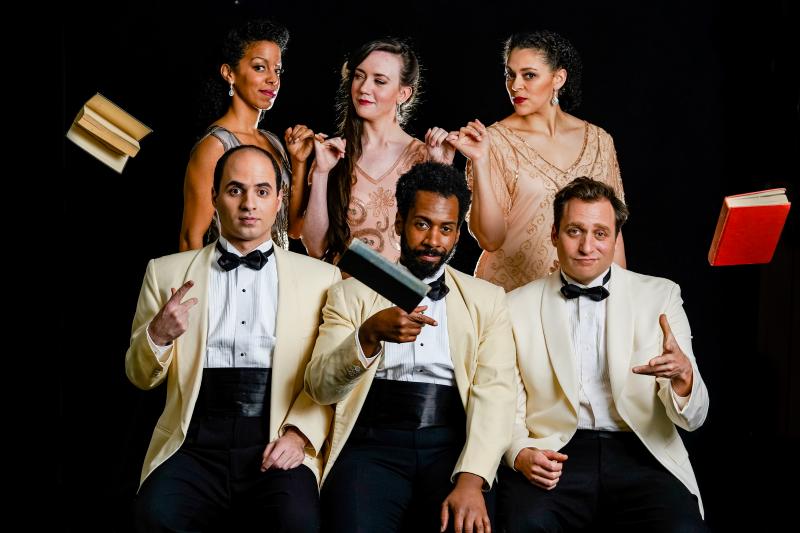Interview: Vivienne Benesch of LOVE'S LABOR LOST at Folger Shakespeare Theatre
 "Words, words, words" -- so uttered by William Shakespeare himself -- and the driving force in director Vivienne Benesch's restyled production of Love's Labor's Lost at the Folger Theatre in Washington D.C.
"Words, words, words" -- so uttered by William Shakespeare himself -- and the driving force in director Vivienne Benesch's restyled production of Love's Labor's Lost at the Folger Theatre in Washington D.C.
Benesch is making her Folger Theatre debut with Love's Labor's Lost, running April 30-June 9th, and has dug into the very marrow of Shakespeare's quick-witted comedy filled with oaths, trickery, and confessions of love.
"In this play, Shakespeare was having a great time showing off the artifice of language," said Benesch, who currently serves as the producing artistic director of Playmakers Repertory Company in Chapel Hill, North Carolina. "But what do these words mean?"
Assigning meaning and motivation to each word prompted Benesch to take a red pen to one of Shakespeare's earliest comedies. Striking through what she considers too arcane or too verbose for today's audience, Benesch has carefully curated the wit, charm and unexpected depths that makes Shakespeare's plays resonate.
Her work began when she lifted the play out of the 1500s and dropped its flirtatious, conniving characters into the 1930s. It was a scenic shift prompted by the Folger Theatre itself. Benesch had taken a tour of the theatre's Paster Reading Room, built in 1932, and within minutes knew the intellectual elegance and romantic grandeur the room evoked were a perfect setting for Shakespeare's Navarre.

"Thirties era films, plays and literature are so like Shakespeare in that they're incredibly quick-witted, elegant and have this spirit of 'we're going to change the world, but we don't know what that means yet,'" Benesch remarked.
Looking for that meaning, Benesch again honed in on the words to clarify Love's Labor's Lost -- a work that belied Shakespeare's status as a young playwright still honing his craft. Stepping in as a dramaturg for a play written nearly 4 millenia go, Benesch guided the actors in a performance that held true to the play's origins without making the audience struggle to understanding its heightened language.
Putting in that work on the audience's behalf allowed Benesch to trust her message was delivered, and shift her focus on the play's tone. Buoyancy, she said, is what keeps the play witty and not too mean or too emotional. But at the same time, to keep the play moving, she had to temper that bounce by curbing the clowning.
"I'm literally on a balance beam teetering between comedy and pacing," Benesch said. "The play can't be [too funny] and separated from the stakes, but you can't lose the heart that makes you care about these characters."
Drawing from her own experience as an actor with credits on stage and on screen -- performing alongside Gene Wilder, Al Pacino, Maggie Smith and Blythe Danner -- Benesch knew part of her balancing act would be finding a character actor who could also command the stage. Enter Zachary Fine, seen in the Folger Theatre's The Two Gentlemen of Verona with Fiasco Theater, who plays perpetual bachelor Berowne. For Benesch, his ability to be both leading man and clown has given the play its agility.
But agility is not just for the actors. The script itself has had to adapt since Benesch first picked it up two decades ago when she was selected to play the Princess of France. Here is a play, Benesch remarked, that is about men behaving badly and women refusing to accept it in an era when the #MeToo movement has brought this conflict to the forefront of our consciousness. It's also a play whose whimsy requires the audience to embrace joy, Benesch continued, in an era when current events are not so fun.
That's why it's joy that Benesch hopes to instill in the audience; a desire to love and be loved. "I just hope this play can be an escape from our everyday experience," she said.
Love's Labor's Lost is on stage from April 30 through June 9, 2019. Tickets are available online at www.folger.edu/theatre or by calling the Folger Box Office at (202) 544-7077.
Comments

Videos
